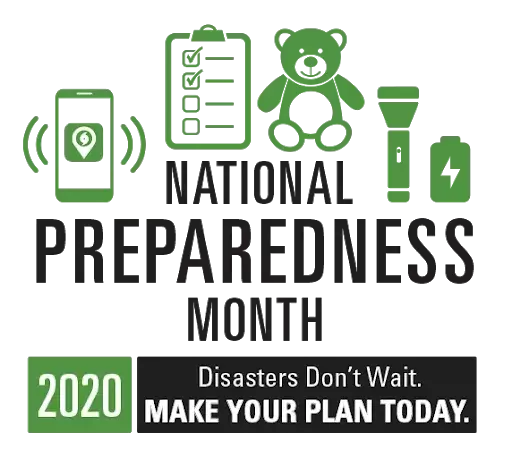|
What can you do to Prepare?
Emergency preparedness is everyone's job. Disasters of all kinds, ranging from floods to winter storms, can happen when least expected. It is important that each household be prepared before disaster strikes with a 72-hour Family Emergency Kit, so each family can be self-sufficient until relief arrives. Assembling the following items to create your own 72-hour Family Emergency Kit will be a great start in preparing your household for the new millennium. Such preparation will be valuable in potential emergencies that may affect our area such as blizzards, power outages, floods, tornadoes, or hazardous materials spills. You Must Be Ready To Act on Your Own The 72-Hour Emergency Kit should be individually tailored to meet the basic survival needs of your family for three days to a week. Most families prefer to store their emergency supplies in a location that is relatively safe, yet easily accessible if evacuation is required. Items may be stored in a 32-gallon trash can, suitcase, duffel bag, footlocker or individual pack (with a note on top listing a few items to grab if you have to evacuate). Emergency Needs Water Storage (1 gallon/person/day) Sleeping Bag and Blanket (wool and thermal) First Aid Kit and Manual Emergency Candles Waterproof/Windproof Matches Extra Eyeglasses/Contact Lenses Non-Perishable Foods Water Purification Tablets Utility Knife Manual Can Opener Extra Clothing Battery Powered Radio Flashlight Essential Medications Suggested non-perishable food items: Ready-to-eat goods in unbreakable containers, canned meats, juice, fruits and vegetables, powdered milk, infant care foods, crackers, peanut butter, freeze-dried and dehydrated goods. (Store what you normally eat. Children will not eat food that is strange to them.) Sanitation Kit Plastic Bucket w/Tightly Fitted Lid Baby Supplies Plastic Bags and Ties Aluminum Foil Disinfectant Paper Towels Improvised Toilet Seat Toilet Paper Personal Hygienic Needs Soap Paper Cups and Plates Plastic Utensils Personal Toiletries Other Emergency Needs Pen and Paper Work Gloves Money Basic Tools Address and Phone Number Children's Securities (blanket, pacifier, etc.) Standard First Aid Kit First Aid Manual Scissors Aspirin or Pain Relievers Sanitary Napkins (Pressure Dressing) Triangular Bandages (36"x36"x52") Disposable Diapers (Dressing/Splint/Padding) Car Survival Kit Always Maintain at Least 1 Tank of Gas Non-Perishable Food Stored in Coffee Can First Aid Kit and Manual Flashlight and Batteries Class ABC fire Extinguisher Waterproof Matches and Candles Radio and Batteries Bottled Water Reflectors and Flares Jumper Cables Bag of Sand, Shovel and Tools Short Rubber Hose for Siphoning Paper, Pencil, Map, Tissues, Pre-moistened Blankets or Sleeping Bag Towels, Plastic Bags, Essential Medications Make Copies of All Legal Papers Marriage License Jewelry Appraisals House Mortgage Drivers Licenses Automobile Ownership Insurance Policies Wills Bank Accounts Vacation Home/ Property Ownership Trailers, Snowmobiles, Boat Ownership RV Ownership Take color pictures of every room plus pictures of valuables. Send one copy of legal papers and one copy of pictures to an out-of state contact. Plan How Your Family Will Stay in Contact if Separated by Disaster Pick two meeting places: A location a safe distance from your home in case of fire. A place outside your neighborhood in case you can't return home. When Assembling Emergency Supplies for the Household, Include Items for Pets How to Store Water Store your water in thoroughly washed plastic, glass, fiberglass or enamel-lined metal containers. Never use a container that has held toxic substances. Remember that your hot water tank is a source of 40 to 50 gallons of drinking water. Be sure to purify the water by: Boiling Disinfecting (household liquid bleach: 16 drops/gal. of water, stir and let stand 30 min.) Distillation (boil pot of water and collect the vapors by tying a cup to the upside down pot lid - the cup shouldn't dangle in the water - it will condense back to water in the cup) Other Considerations Stock supplies to last several days to a week for each family member. Have extra cash on hand in case electronic transactions (ATM card, credit cards, etc.) cannot be processed. Work with your family in talking about the steps each needs to take to be ready if disaster happens.
0 Comments
Your comment will be posted after it is approved.
Leave a Reply. |
Categories
All
Archives
September 2022
|




